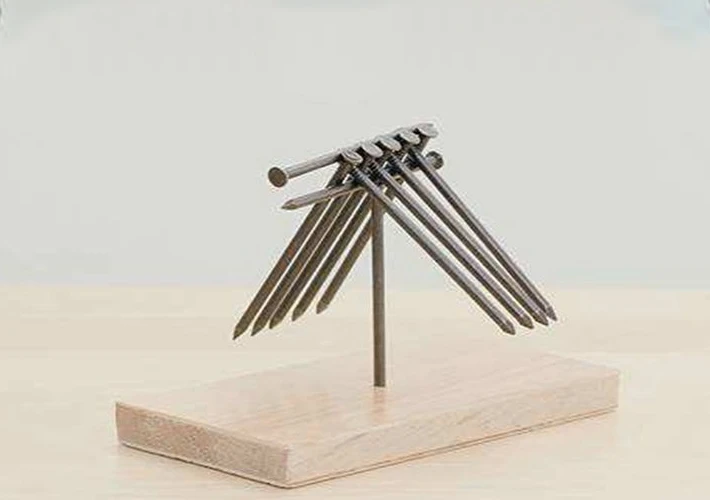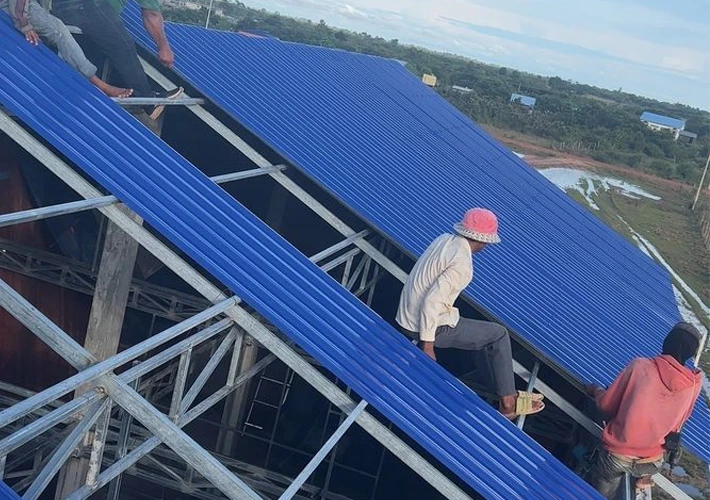Steel nails are one of the most common and indispensable fasteners in the construction, manufacturing, and woodworking industries. From home renovation projects to industrial construction, these small yet powerful metal components play an essential role in holding materials together. But have you ever wondered what makes steel nails so versatile and why they are preferred across so many applications?
This article provides a comprehensive overview of steel nails, including their types, properties, and applications, as well as guidance on choosing the right type of nail for different uses. If you’re in the construction, manufacturing, or import-export business, understanding the full scope of steel nail applications will help you make more informed purchasing and production decisions.
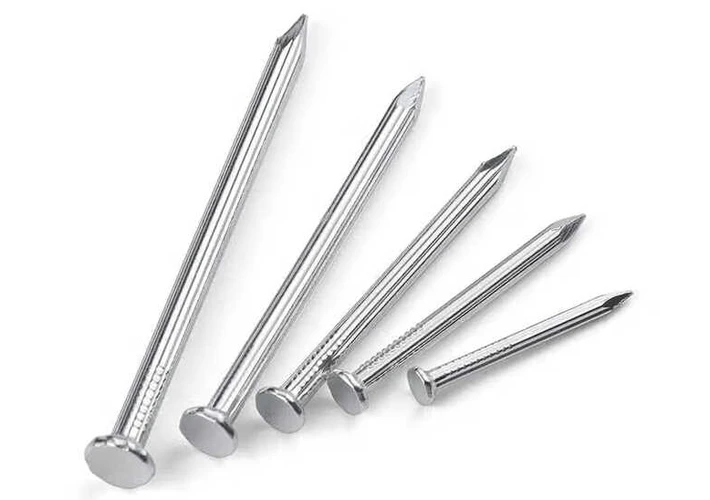
What Are Steel Nails?
Steel nails are metallic fasteners made primarily from carbon steel or stainless steel, designed to join materials—usually wood, metal, or concrete—by being driven into them using a hammer, nail gun, or other mechanical tool. They have a simple structure that typically includes:
- Head: The top part that provides striking surface and prevents the nail from going too deep.
- Shank: The body of the nail, which may be smooth, spiral, or ringed for better holding power.
- Point: The sharp tip designed to pierce the material.
While their structure seems simple, nail design and material composition vary greatly depending on the intended use.
Types of Steel Nails
Steel nails come in a wide variety of types and shapes, each optimized for specific applications. Below are the most common ones used in modern construction and manufacturing:
(1) Common Nails
Material: Carbon steel
Features: Thick shank, large flat head, and sharp point
Uses: General construction, framing, carpentry
Advantages: Strong holding power for heavy-duty wooden structures
(2) Finishing Nails
Material: Polished or galvanized steel
Features: Small head that can be easily hidden
Uses: Interior trim, moldings, furniture, cabinetry
Advantages: Provides a clean, aesthetic finish
(3) Concrete Nails
Material: High-carbon steel or hardened steel
Features: Hard, fluted shank to penetrate concrete or masonry
Uses: Fixing wooden frames or materials onto concrete walls
Advantages: Excellent penetration and anti-bending strength
(4) Roofing Nails
Material: Galvanized or stainless steel
Features: Wide flat head to hold roofing materials securely
Uses: Securing roofing felt, shingles, or sheet materials
Advantages: Rust-resistant and weatherproof
(5) Coil Nails
Material: Carbon steel, stainless steel
Features: Nails are arranged in coils for pneumatic nail guns
Uses: Pallet manufacturing, decking, fencing, siding
Advantages: Increases productivity and consistency in nailing
(6) Ring Shank Nails
Material: Galvanized or stainless steel
Features: Circular ridges along the shank for extra grip
Uses: Flooring, decking, and subfloor applications
Advantages: Stronger holding capacity than smooth nails
(7) Brad Nails
Material: Fine gauge steel
Features: Thin nails for delicate woodwork
Uses: Furniture, cabinets, decorative trim
Advantages: Minimizes wood splitting and visible holes
(8) Duplex Nails (Double Headed)
Material: Carbon steel
Features: Two heads—one for driving and another for easy removal
Uses: Temporary construction, scaffolding, formwork
Advantages: Easy to pull out after temporary structures are dismantled
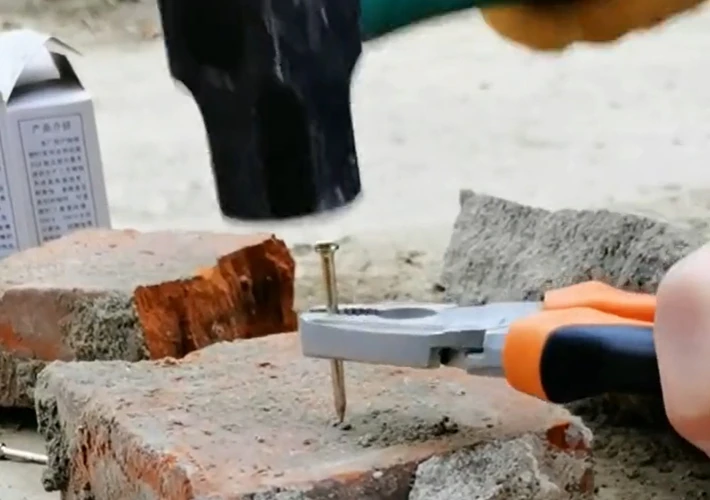
Material Types of Steel Nails
The performance of a nail largely depends on its steel composition. Below are the main material types:
(1) Low-Carbon Steel Nails
Carbon Content: <0.25%
Characteristics: Soft and ductile, easy to manufacture
Uses: General woodworking and light construction
(2) High-Carbon Steel Nails
Carbon Content: 0.6–1.0%
Characteristics: Very hard and strong, high tensile strength
Uses: Concrete nails, masonry nails, structural fasteners
(3) Stainless Steel Nails
Composition: Contains chromium and nickel
Characteristics: Corrosion-resistant, ideal for outdoor use
Uses: Marine projects, roofing, siding, decks
(4) Galvanized Steel Nails
Process: Coated with a layer of zinc for rust prevention
Characteristics: Long lifespan, suitable for exterior use
Uses: Outdoor structures, fencing, roofing
Common Uses of Steel Nails in Different Industries
Steel nails are used in a wide range of industries. Below are the most common application scenarios:
(1) Construction and Building Industry
The construction industry is the largest consumer of steel nails globally. Their applications include:
- Framing wooden structures
- Attaching roofing materials
- Flooring and decking installations
- Fixing plasterboard or drywall
- Securing concrete and masonry components
Steel nails are vital in ensuring structural integrity and long-term stability of buildings.
(2) Furniture Manufacturing
In furniture production, steel nails—especially finishing and brad nails—are used for:
Joining wooden panels
Fixing upholstery frames
Assembling cabinets and drawers
They provide a neat appearance and strong joints without visible marks.
(3) Packaging and Pallet Industry
In global trade, steel nails are essential for pallet manufacturing:
- Used with coil nail guns for high efficiency
- Ensures durability during cargo transport
- Helps meet international packaging standards (ISPM 15)
(4) Automotive and Metal Fabrication
Some specialized steel nails and fasteners are used in metal joining or automotive interior assembly.
They offer:
- High tensile strength
- Vibration resistance
- Long service life under mechanical stress
(5) Home Renovation and DIY
For home repair projects, steel nails are widely used for:
- Hanging pictures or decorations
- Repairing furniture
- Installing shelves or trims
Their affordability and versatility make them a staple in every toolbox.
(6) Roofing and Outdoor Construction
Galvanized and stainless steel nails are preferred for:
- Attaching asphalt shingles or metal sheets
- Building decks and fences
- Outdoor wooden structures like gazebos and pergolas
The anti-corrosion properties of coated nails extend service life even in harsh weather.
(7) Concrete and Masonry Projects
For hard surfaces like concrete or brick walls, hardened steel nails are indispensable.
They can:
- Secure frames to masonry
- Fasten electrical conduits
- Install insulation or boards on concrete walls
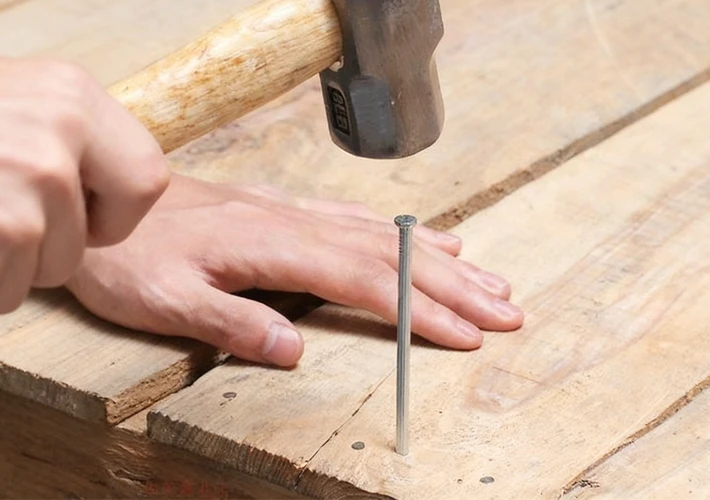
Advantages of Using Steel Nails
Steel nails offer a combination of strength, durability, and cost-efficiency unmatched by other fastening options.
(1) High Strength and Toughness
Steel provides excellent tensile and shear strength, making nails resistant to bending or breaking during installation.
(2) Corrosion Resistance
When galvanized or stainless, steel nails withstand moisture, humidity, and chemical exposure, ensuring long-term durability.
(3) Cost-Effective
Compared to screws or bolts, nails are cheaper to produce and faster to install, reducing overall labor and material costs.
(4) Versatility
Available in multiple sizes, shapes, and coatings, steel nails can be used across wood, concrete, metal, and composite materials.
(5) Compatibility with Power Tools
Steel nails are compatible with modern nail guns, boosting construction speed and efficiency.
How to Choose the Right Steel Nail
Choosing the correct nail type ensures structural safety and aesthetic quality. Here are key factors to consider:
| Factor | Description | Recommendation |
|---|---|---|
| Material | Depends on environmental conditions | Stainless or galvanized for outdoor use |
| Size | Length and thickness relative to material | Nail should penetrate 2/3 of the base material |
| Head Type | Affects appearance and holding power | Flat head for framing, small head for finishing |
| Coating | Prevents corrosion | Zinc, epoxy, or phosphate coating |
| Shank Type | Determines grip strength | Smooth for light jobs, ring or spiral for heavy-duty use |
Example:
- For roofing → Use galvanized roofing nails
- For furniture → Use finishing or brad nails
- For concrete → Use hardened steel concrete nails
Global Market and Demand for Steel Nails
The global steel nail market has seen consistent growth due to rapid urbanization and construction activities.
- Market size (2024): Estimated at USD 12.5 billion
- Projected CAGR (2024–2030): Around 3.8%
- Top consumption regions: China, India, United States, and Southeast Asia
Driving factors:
Increasing demand for affordable housing
Growth in furniture exports
Expansion of packaging and pallet industries
Rise in DIY home renovation trends
China remains the world’s leading manufacturer and exporter of steel nails, offering competitive pricing and high-quality standards. Many buyers from North America, Europe, and Africa import directly from Chinese factories due to efficient mass production and customizable specifications.
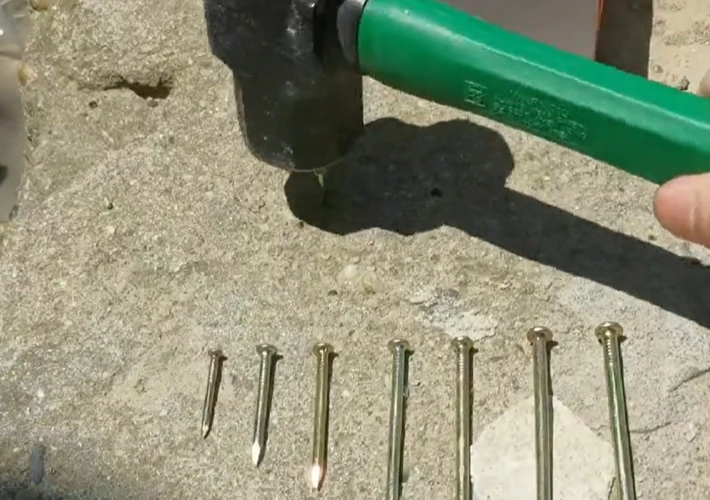
Steel Nail Coating and Surface Treatment
To improve performance and extend service life, manufacturers apply various coatings:
| Coating Type | Purpose | Typical Application |
|---|---|---|
| Galvanized (Zinc Coating) | Prevents rust, increases outdoor durability | Roofing, fencing, outdoor decking |
| Phosphate Coating | Enhances paint adhesion and corrosion resistance | Interior construction |
| Vinyl Coating | Improves friction, reduces bending during driving | Framing, carpentry |
| Epoxy Coating | High corrosion resistance for marine environments | Coastal construction |
Proper coating ensures the nails maintain mechanical strength and aesthetic quality for years.
Quality Testing and Standards for Steel Nails
To ensure durability and reliability, steel nails are tested according to international standards such as:
- ASTM F1667 – Standard for driven fasteners in the U.S.
- EN 14592 – European standard for fasteners for timber structures
- ISO 898-1 – Mechanical properties of steel fasteners
Testing parameters include:
- Tensile and shear strength
- Bending performance
- Corrosion resistance
- Dimensional accuracy
Manufacturers who comply with these standards are more trusted by global importers and contractors.
Conclusion: Why Steel Nails Remain Indispensable
Steel nails might seem simple, but they are the foundation of modern construction and manufacturing. Their combination of strength, versatility, and cost-effectiveness makes them irreplaceable across industries—from building homes and assembling furniture to securing cargo pallets and roofing materials.
For importers and distributors, sourcing high-quality steel nails from reliable Chinese manufacturers ensures you get competitive pricing and consistent performance.
If you are looking for:
- Bulk steel nails for construction or industrial projects
- Custom sizes or surface coatings
- Factory-direct prices for global export
👉 Contact our professional steel nail manufacturing team in China.
We provide OEM & ODM services, strict quality inspection, and fast global shipping to meet all your business needs.



